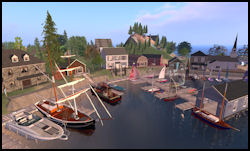Transcript of Metanomics “Connecting the Dots” on Grid Legal Issues
August 4th, 2008 by Benjamin Duranske
I appeared on Robert Bloomfield’s popular metaverse news and policy show Metanomics today doing the end-of-show op-ed piece “Connecting the Dots.” Today’s show was entitled “Open Sim and the Future,” and featured IBM’s Zha Ewry and Linden Lab’s Zero Linden talking about the future of the grid, and their efforts so far. I know there are some bumps ahead on the road to “the grid” but at bottom,  I really like the way Linden Lab is handling it, and Zha’s and Zero’s comments today only solidified that.
I really like the way Linden Lab is handling it, and Zha’s and Zero’s comments today only solidified that.
The full show is available at SLCN.tv (video), and my Connecting the Dots segment is destined for YouTube (will update when it’s there). For text fans, here are the first few paragraphs of my video editorial, followed by a link to the full transcript at Metanomics:
The biggest legal impact of “the grid” is that local laws will govern. Want to run a casino? Drop a server in Antigua. But that’s the easy part. As [IBM’s] Zha [Ewry and Linden Lab’s] Zero [Linden] noted, content export is hard, technically. It’s also hard legally. And make no mistake, content export is coming, even though it’s not in the beta. The marketplace will demand it.
So what happens to my suit, hair, and skin, all of which were designed by talented residents, when I take my avatar to the Antigua world to play some blackjack? And what if the guy who runs the casino there programs his server to let me make unauthorized copies of that stuff?
That’s not a new question. I dug up an old audio recording from Second Life’s first birthday where then-CEO Philip Rosedale discusses interoperability and export content from Second Life to other locations on the 3D internet. Philip says: “I don’t think that we fundamentally object to people being able to take their content with them. I believe that the content people create, even if there are many digital worlds out there for you to be in, the content you create should be your own property. In the end, the more open systems will win.”
Philip was actually responding to a resident’s concern that Linden Lab might not allow content exporting to other worlds for business reasons. Today, residents are far more concerned that Linden Lab will allow exporting — perhaps to grids without the same technological solutions in place to protect content…
You can read the rest of the transcript of Benjamin Duranske’s “Connecting the Dots” re: legal issues and “the grid” over at Metanomics.
Related Posts on Virtually Blind
- Benjamin Duranske on the Law of the Grid on Metanomics Monday, August 4 at 12:00 Pacific: "Quick note to let readers know that I'll be on Robert Bloomfield's..." (2 comments)
- Robert Bloomfield in the Guest Chair on Metanomics, Monday, September 22 at Noon Pacific: "The fall season of the popular in-world metaverse business and policy..." (0 comments)
- Found Audio Archive: Philip Rosedale Answering Questions at First Second Life Birthday Party: "I recently came across an audio recording of Second Life founder ..." (2 comments)


 Quick note to let readers know that I’ll be on Robert Bloomfield’s popular metaverse business and policy show
Quick note to let readers know that I’ll be on Robert Bloomfield’s popular metaverse business and policy show  I recently came across a
I recently came across a  Bob Brackman: I began my legal career almost 30 years ago as an organized crime prosecutor in New York State. I also served as an Inspector General, and as New York City’s Deputy Commissioner for Investigations.
Bob Brackman: I began my legal career almost 30 years ago as an organized crime prosecutor in New York State. I also served as an Inspector General, and as New York City’s Deputy Commissioner for Investigations. Fresh off its
Fresh off its 